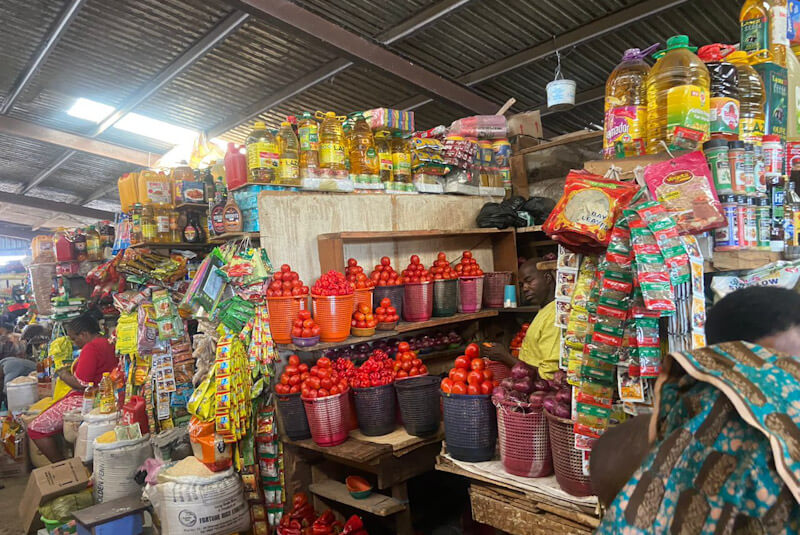For a layman, the exchange rate of the United States’ Dollar to the Naira should have nothing to do with the price of local yam tubers, fish or bread baked in the neighborhood.
But the National Bureau of Statistics (NBS) reported food inflation early this month. Although it didn’t link it to the exchange rate, it said the food inflation on a year-on-year basis was caused by increases in prices of bread and cereals, potatoes, yam and other tubers, oil and fat, fish, meat, fruit, coffee, tea, and cocoa.
Advertisement
Food inflation has been on the rise on a month-on-month basis, hitting 3.21 percent in January from 2.72 percent in December 2023.
Food inflation has reportedly led to economic hardship for many Nigerians who’re unable to meet reasonable basic living expenses again.
Foodstuff sellers across the country are lamenting the situation, and many who spoke to the THE WHISTLER said business has been challenging since last year.
“Market is tough”, said Emeka, a trader in Lagos. “Business has not been going well since last year. But, it got worse this year.”
Advertisement
Emeka said that about two months ago, a bag of rice was N45,000, but now it is N75,000, while a bag of garri that was previously N25,000 is now N41,000, and a Derica of beans N1,200.
He complained that turnout of customers has drastically reduced due to high cost of foodstuffs.
Benjamin Ogbu sells foodstuffs at Orba International Market in Udenu LGA of Enugu State. He said most of the foodstuff he sells are procured from Northern Nigeria.
“Our business is full of uncertainties because we don’t produce much in Enugu State and South East in general. We depend on supplies from the North. You may buy a bag of rice at N80, 000 today, but when you return to the market the next day, it has added N20,000,” he lamented.
The proprietor of Mubas Table water in Sokoto, Ashiru yunusa, told THE WHISTLER that the cost of materials for production had risen.
Advertisement
“The cost of leather alone has doubled what it used to be before, we use fuel, how much is a litre of fuel now? As a manufacturer you have to calculate all these things before you attach a price to your product.
“We sell a bag of pure water 150 before, when things change, we have to make it 200 still there is no much gain as it used to be. It is not our fault I think all these things have to do with the rate of dollar exchange,” he explained.
The Director General of the Manufacturers Association of Nigeria (MAN), Segun Ajayi-Kadir, confirmed Yunusa’s statement. He said for nearly a decade manufacturers have had challenges accessing FX for importation of raw materials, machines and spare parts that are not available locally, and have had to source FX from the parallel market, which he said has increased cost of input and made them uncompetitive.
“The rate at which our import duty is calculated has gone northwards. I think the last count was about N1,600 (to $1),” Ajayi-Kadir told THE WHISTLER, and warned that if nothing was done to address the current FX challenges, the capacity utilisation of the industry may go down, even in the first quarter of this year.
Economists Speak
Economists who spoke to THE WHISTLER confirmed that the exchange rate of the dollar to the naira is at the heart of food inflation.
According to Ayo Teriba, chief executive officer of Economic Associates, apart from imported food items sold in supermarkets, some locally produced food items have components that are imported, such as bread which relies on imported.
Advertisement
“To the extent that food is equally likely to be imported or locally produced, exchange rate will pass through to the food index. Whether you’re talking of outright import or hybrid, or whether it’s domestically produced, exchange rate will pass through to them.
“For example, the machinery used to cultivate them, the pesticides imported, imported fertilizers, seedlings, fuel etc . To the extent that farm inputs are themselves imported, when the exchange rates moves, you should expect the impact on the food component of the CPI,” he explained.
Teriba’s views are supported by Professor Segun Ajibola, former President of Chartered Institute of Bankers of Nigeria (CIBN).
He explained to THE WHISTLER that the rising streak in the country’s inflation is cost related.
He said that the pressure arising from the FX market is driving the cost of commodities in the market.
“The factors are cost related, which means cost of production is pushing up prices. Whatever we import into the country, because of the exchange rate, it has increased in naira term. What we used to import say $1,000 this time last year, which if you change to naira then should be about N460,000 officially, today the same $1,000 is getting to N2m – because it’s about N1.8m, N1.9m.
“So, somebody who incurred N460,00 to import something last year and is paying about N2m to import the same thing this year, he’ll sell it based on the cost incurred in importing it,” Ajibola stated.
The removal of fuel subsidy last year was already driving cost before the recent floating of the Naira by the Central Bank of Nigeria.
He explained that increase in the cost of energy (fuel and diesel) has been impacting on local production as the cost of production is now higher than what it was before.
“The cost (of energy) has increased between last year and now. So, that’s what is called Cost Inflation. Inflation arising due to increases in cost – either cost of production or cost of importation. That’s the kind of inflation that is confronting us in Nigeria,” he said.

What Government Needs To Do
Teriba said the Federal Government should prioritize and not treat every problem as if they’re of equal importance. “The government is not prioritizing the problems. Food prices are high, they say, open the grain silos. When you deplete the grain reserves, what’s next? We’re actually not doing anything to address the exchange rate issue which is not only complicating the food price shock, but also behind the energy price shock. It’s behind the restiveness of labour,” he said.
He urged the government to prioritize shoring up the foreign reserve through quick foreign direct investments.
“Put together a special committee to raise foreign investments, to do whatever it has to do within a month or two to boost the inflow of foreign investments into Nigeria . Unless you raise reserve, exchange rate will forever be volatile. So, you need to address the foreign exchange rate as you address the other components. The problems are interrelated. So, the solutions have to be interrelated,” he suggested.
While Prof Ajibola thinks the floating of the naira was the right thing to do because of the arbitrariness in the system, he advised that the floating needed to have gone along with certain fiscal measures.
He called on the government to introduce policies and programmes that will be targeted at reducing importation, as well as getting the refineries working to reduce energy cost.
He questioned the government’s lifting of the ban imposed on the importation of 43 items by the Muhammadu Buhari administration, stressing that it was contributing to pressure on the naira since the country has limited FX supplies.

Prof Uche Uwaleke, a Fellow of the Chartered Institute of Bankers of Nigeria,said to curb the food inflation dynamics, monetary, fiscal, and trade policies must be properly coordinated in order to boost production.
He also urged the state governments to apply the increase in FAAC allocation due to naira devaluation on productive activities.
Also speaking on solutions, Ajayi-Kadir said the government should focus on local production, reduce import duty calculation for importation of raw materials, machines and spare parts for manufacturers.
He also called for the denomination of sale of gas in naira instead of the current denomination in dollars.
Nze Kanayo Chukwumezie, a political economist, urged the government to end importation of petroleum products in one year, make all the refineries work and encourage completion of private and state ones being built while also reducing exportation of local raw materials and minerals (including crude oil) by 70 per cent.
Additional reports by: Ifeanyi Onuba, Chinedu Aroh, Ikenna Omeje and Shafa’atu Suleiman



